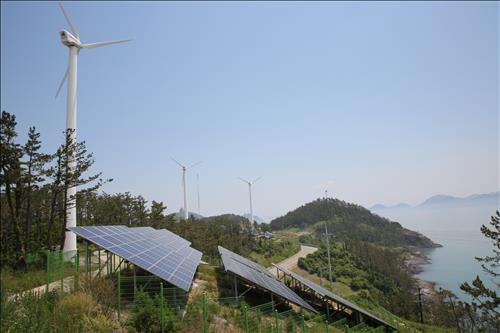- California Assembly OKs highest minimum wage in nation
- S. Korea unveils first graphic cigarette warnings
- US joins with South Korea, Japan in bid to deter North Korea
- LPGA golfer Chun In-gee finally back in action
- S. Korea won’t be top seed in final World Cup qualification round
- US men’s soccer misses 2nd straight Olympics
- US back on track in qualifying with 4-0 win over Guatemala
- High-intensity workout injuries spawn cottage industry
- CDC expands range of Zika mosquitoes into parts of Northeast
- Who knew? ‘The Walking Dead’ is helping families connect
UN climate fund picks Korean off-grid energy model as 1st project

Shown is a photo of South Korea’s energy-independent island of Gasado, located some 470 kilometers south of Seoul, where wind and solar power sources supply more than 80 percent of the island’s overall consumption. This will provide the basis of the Amazonian farming project proposed by South Korea. (Photo courtesy of KEPCO)
SEJONG (Yonhap) — The United Nations climate change fund dedicated to tackling environmental challenges facing developing countries has picked a South Korean energy model for its first official support project, the finance ministry said Friday.
The decision, reached at the 11th board meeting of the Green Climate Fund (GCF) in Zambia, aims to provide around-the-clock electricity to fruit processing plants in the northwestern Amazon Basin region near the Maranon and Pastaza rivers.
The ministry said that the project will use solar power generators and energy storage systems to provide electricity without the need for people to cut nearby forests. At present, the plants rely on fossil fuel and burning trees, which is releasing greenhouse gases into the atmosphere.
“By processing fruits and juice in an eco-friendly and sustainable manner, the GCF aims to improve the livelihoods of people in the region,” said Kim Hoe-jeong, head of the ministry’s international financial cooperation bureau.
He said the off-grid model was one of four clean energy projects proposed by Seoul at the South Korea-Association of Southeast Asian Nations special summit in December 2014.
The official said the Peruvian project is similar to the energy self-sufficient island programs under way in South Korea.
The five-year project that will kick off in March 2016 is relatively small, requiring some US$9.11 million in support, but the ministry said it is significant because it marks the start of support for the South Korea-based GCF.
Of the total, the GCF will foot $6.24 million, with the Korea International Cooperation Agency contributing $1.8 million, while Peru’s environmental protection fund — Profonanpe — will add $1.07 million.
Launched in late 2010, the GCF, based in Songdo, west of Seoul, aims to channel money from industrialized nations to developing countries to help them cope with climate change-related problems. So far the fund has raised US$10.2 billion won in funds since its launch and has been selecting “accredited agencies” that will support future projects.
















